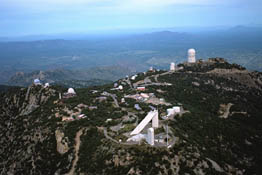
National observatories such as the Kitt Peak National Observatory seen here will continue to receive the bulk of their funding from the National Science Foundation.
Courtesy NOAO/AURA/NSF.
A committee of leading American astronomers and space
scientists have opposed a suggestion by the Bush administration that
National Science Foundation (NSF) funding for astronomy be transferred
to NASA. In a 54-page report published yesterday, the 11-member blue-ribbon
panel concluded that, "moving NSF's astronomy and astrophysics activities
to NASA would have a net disruptive effect on scientific work."
"[Astronomy] isn't broke enough that you have to take
a sledge hammer to it and start over," says John Huchra (Harvard-Smithsonian
Center for Astrophysics), one of the report's astronomical reviewers.
Beginning in June, the Committee on the Organization
and Management of Research in Astronomy and Astrophysics (COMRAA)
met three times to discuss the feasibility of transferring NSF's astronomical
funding role to NASA. Traditionally NSF has chosen which ground-based
astronomical ventures should be funded by federal dollars, while NASA
focused on space-based endeavors. But significant scientific overlap
exists between the two agencies, and in recent years, the efficiency
of such a funding system has come into question.
The COMRAA report strongly encourages the formation
of an interagency Astronomy and Astrophysics Planning Board to improve
communication and better integrate ground- and space-based astronomy.
It also recommends that the federal government develop a single strategy
that includes support for both ground and space astronomical facilities.
"Great benefits can be had if the agencies work together,"
says Huchra.
 0
0
Comments
You must be logged in to post a comment.